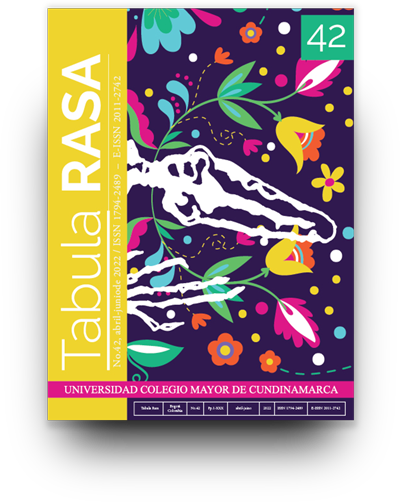Adaptation, validation and invariance tests of carnism inventory in the spanish language
Adaptación, validación y pruebas de invarianza de la versión en español del carnism inventory
Show authors biography
The beliefs revolving around the practice of eating animals are widely accepted and lead to an ideology known as carnism. This study aims to validate the carnism inventory, which measures two components of those beliefs: the defense of carnism and carnist domination. The defense of carnism would render legitimate the practice of eating animals based on arguments stemming from tradition, taste or need; while carnist domination would support animal slaughter based on the notion of a natural hierarchy and our natural right to rule over animals and used them for our own purposes. The bidimensional structure was confirmed and a fair internal consistency was achieved for a complete scale (α = 0,735). The dimensions showed a positive correlation (r = 0,407). The scale yielded good adjustment indexes and we were able to support the configuration and metric invariance of the carnism inventory for both males and females.
Article visits 121 | PDF visits 71
Downloads
- Adams, C. (2016). La política sexual de la carne. Una teoría crítica feminista vegana. Madrid: Ochodoscuartos Ediciones.
- Bastia, B., Costello, K., Loughnan, S. & Hodson, G. (2012). When Closing the Human– Animal Divide Expands Moral Concern: The Importance of Framing. Social Psychological and Personality Science, 3(4), 421-429. http://doi.org/10.1177/1948550611425106
- Byrne, B. (2001). Structural equation modeling with AMOS. Basic concepts, applications, and programing (2nd ed.). London: Routledge.
- Cheung, G. & Rensvold, R. (2012). Evaluating goodness-of-fit indexes for testing measurement invariance. Structural Equation Modeling, 9(2), 233–255. http://dx.doi.org/10.1207/S15328007SEM0902_5
- Christopher, A., Bartkowski, J. & Haverda, T. (2018). Portraits of Veganism: A Comparative Discourse Analysis of a Second-Order Subculture. Societies, 8(3), 1-21. https://doi.org/10.3390/soc8030055
- De Backer, Ch., Erreygers, S., De Cort, Ch., Vandermoere, F., Dhoest, A., Vrinten, J., Van Bauwel, S. (2020). Meat and masculinities. Can differences in masculinity predict meat consumption, intentions to reduce meat and attitudes towards vegetarians? Appetite, 147(1), 104559. https://doi.org/10.1016/j.appet.2019.104559
- Dhont, K. & Hodson, G. (2020). WhyWe Love and Exploit Animals: Bridging Insights from Academia and Advocacy. London: Routledge. https://doi.org/10.4324/9781351181440
- Dhont, K., Hodson, G., Costello, K. & MacInnis, C. (2014). Social dominance orientation connects prejudicial human–human and human–animal relations. Personality and Individual Differences, 61-62, 105-108. https://doi.org/10.1016/j.paid.2013.12.020
- Francione, G. & Charlton, A. (2015). Animal Rights: The Abolitionist Approach. Warsaw: Exempla Press.
- Joy, M. (2013). Por qué amamos a los perros, nos comemos a los cerdos y nos vestimos con las vacas: una introducción al carnismo. Madrid: Plaza y Valdés.
- McDonald, R. P. (1999). Test theory: A unified treatment. New York: Lawrence Erlbaum Associates, Inc.
- Monteiro C.A., Pfeiler T.M., Patterson M.D. & Milburn M.A., (2017). The Carnism Inventory: Measuring the Ideology of Eating Animals. Appetite, 113(1), 51-62. http://doi.org/10.1016/j.appet.2017.02.011
- Regan, T. (2014). En defensa del derecho de los animales. México: Fondo de Cultura Económica.
- Ruby, M. & Heine, S (2011). Meat, morals, and masculinity. Appetite, 56(2), 447-450. https://doi.org/10.1016/j.appet.2011.01.018
- Singer, P. (2018). Liberación animal. Madrid: Taurus.




